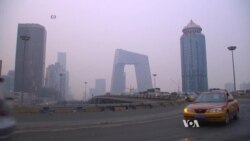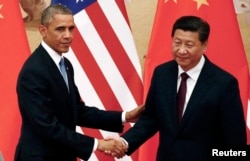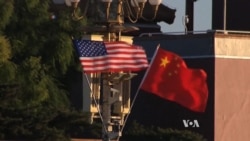China and the United States have jointly announced what they are calling a major agreement on climate change. The agreement was reached following talks in Beijing between President Barack Obama and his Chinese counterpart Xi Jinping.
The announcement, by the world's top two emitters of carbon dioxide, could help play a key role in global efforts to combat climate change.
The two leaders also pledged to work together in a wide range of areas, but differences between the two countries still loom large.
During a joint news conference following high-level talks in Beijing, Washington announced plans to cut greenhouse gas emissions by up to 28 percent by 2025. That goal, if reached, would bring U.S. emissions to levels below those in 2005.
China did not commit to cut emissions, but for the first time Beijing set a goal for its emissions to peak by 2030.
Clean energy sources, such as solar and wind, will account for 20 percent of China's energy production by 2030, said Xi.
Obama said it is an ambitious but achievable goal for the world’s two biggest polluters.
“I commend President Xi his team and the Chinese government for the commitment they are making to slow, peak and then reverse the course of China’s carbon emissions," President Obama said.
China and the United States hope the announcement will help to overcome longstanding differences in the global climate change negotiations and be a “shot of momentum” ahead of next year’s United Nations Climate Change Conference in Paris.
Xi said China is willing to work together with other countries to address global challenges.
“As China continues to develop we will shoulder more and more international responsibilities that match our strengths and position."
The deal on climate change was just one of several announced.
Key Republican leaders in the United States are denouncing the climate change pact.
The presumptive leader of the new Republican majority in the U.S. Senate, Mitch McConnell, said he is distressed by the deal cut by Obama, a Democrat whose policies are often opposed by Republican lawmakers.
"The problem is the president continues to send signals he has no intention of moving toward the middle. I was particularly distressed by the deal apparently he's reached with the Chinese on his current trip, which as I read the agreement requires the Chinese to do nothing at all for 16 years while these carbon emission regulations are creating havoc in my state and other states around the country," said McConnell.
Islamic State, Ebola
Xi said the two countries also will leverage their strengths to fight Ebola. Although some have criticized the speed of China’s initial aid response in the fight against the deadly disease, he noted that China now has more than 300 medical workers in West Africa and has donated more than $100 million to the effort.
The two presidents also agreed to work together to fight other infectious diseases and to promote access to electricity across Africa. Obama said they also talked about enhancing cooperation in Afghanistan and in dealing with terrorist threats such as the Islamic State.
Xi highlighted an agreement the two had reached between their militaries for confidence building measures that include notification of major military activities and rules of behavior for safety of military aircraft and encounters at sea.
Ahead of Obama’s three-day visit to China, it was not expected that the trip would deliver such a wide range of agreements.
Major differences between the two nations still remain, ranging from concerns about China’s human rights policies, its policies in ethnic-minority areas and tightening controls on foreign journalists.
Human rights
Obama said that during his talks with China’s leader he highlighted why Washington feels the freedoms it advocates are universal regardless of whether it is in New York, Paris or Hong Kong.
“We think that history shows that nations that uphold these rights, including for ethnic and religious minorities are ultimately more prosperous, more successful and more able to achieve the dreams of their people," Obama said.
Xi did not directly respond when asked to comment on allegations that ongoing protests in Hong Kong are supported by western forces. Hong Kong’s leader has publicly made the allegation, as has Chinese state media on numerous occasions. The United States denies any involvement in the protests.
Xi said he told Obama that Occupy Central was an illegal movement, adding that China is “firmly supportive of the efforts of the Hong Kong SAR [Special Administrative Region] government to handle the situation in accordance with the law.”
It is unclear whether Xi’s comments were a sign that it was now okay for authorities in Hong Kong to clear the streets. Analysts have widely predicted that once the APEC meetings and high-level talks were over in Beijing, Hong Kong authorities were likely to launch a full-scale crackdown in a bid to end the protests.
Press freedom
And although China and the United States announced the easing of visa restrictions for tourists and business people, Xi was asked by one reporter to respond to concerns about growing restrictions on foreign journalists.
China has rejected or denied visa applications for journalists from the New York Times, Bloomberg and for a reporter from Reuters, in what is widely seen as a campaign to punish individual reporters or their organizations for the stories they publish.
A recent survey of more than 240 foreign correspondents conducted by the Foreign Correspondents Club of China found that 80 percent of those surveyed felt the situation in China for journalists is worsening. Xi, however, suggested that problem was foreign journalists.
“China protects our citizens' freedom of expression and the normal rights and interests of media organizations, in accordance with the law," he said.
Xi argued that when a certain problem is raised there has to be a reason, adding that media outlets need to obey China’s laws and regulations.







